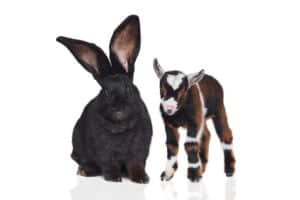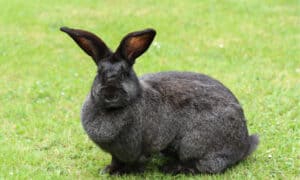Have you ever seen a rabbit that you didn’t want to just scoop up and cuddle? These cute and cuddly little balls of fur are popular domesticated pets, and it’s easy to see why. With their long ears, big eyes, and gentle dispositions, it’s hard not to fall in love with a bunny. Yet, at the same time, it’s important to remember that not all rabbits enjoy human attention. In particular, rabbits living in the wild are notoriously skittish and will bolt if humans get too close.
Also, while they look cuddly and innocent, rabbits are actually much tougher than they appear. You can find wild rabbits in almost any habitat including meadows, grasslands, forests, tundra, deserts, and wetlands. You’ve likely seen a wild rabbit in your backyard or local park on more than one occasion. That said, do you know the answer to the question, “what do rabbits eat?”
To answer this question, we’re going to take some time today to explore what rabbits like to eat. We’ll learn how they forage for food and all about the finely attuned senses that help them to locate nourishment. In addition, we’ll also differentiate the diets of wild rabbits versus domesticated rabbits. Finally, we’ll end with a discussion of what baby rabbits like to eat. Without further ado, let’s hop along and answer the question “what do rabbits eat.”
What Do Rabbits Like to Eat?
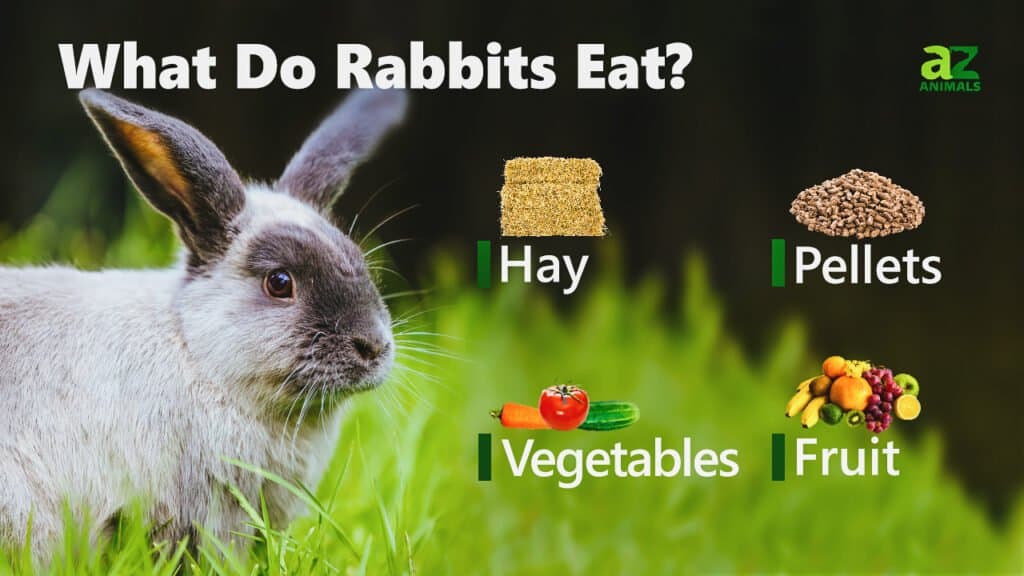
There exist around 30 different species of wild rabbit, and over 300 different domesticated breeds worldwide. While each of these species and breeds differs slightly, they share a number of features in common. Namely, they all eat a similar diet.
All rabbits are herbivores, meaning they only eat plant matter. Rabbits eat a balanced diet of different grasses, vegetables, and plant matter.
That said, rabbits don’t just like to munch on lettuce and carrots, despite what cartoons may lead you to believe.
Rabbit bodies require plenty of fiber to help them digest all that raw plant matter, so rabbits evolved to eat many types of greens. That said, there are certain foods that rabbits truly love to eat, and which they’ll dine on with relish. As such, we’ve narrowed down the list to ten of the most common foods rabbits eat.
These foods include:
- Grasses
- Vegetables
- Fruit
- Hay
- Shoots
- Leaves
- Pellets
- Insects
- Bark
- Needs
- Weeds
How Do Rabbits Forage For Food?
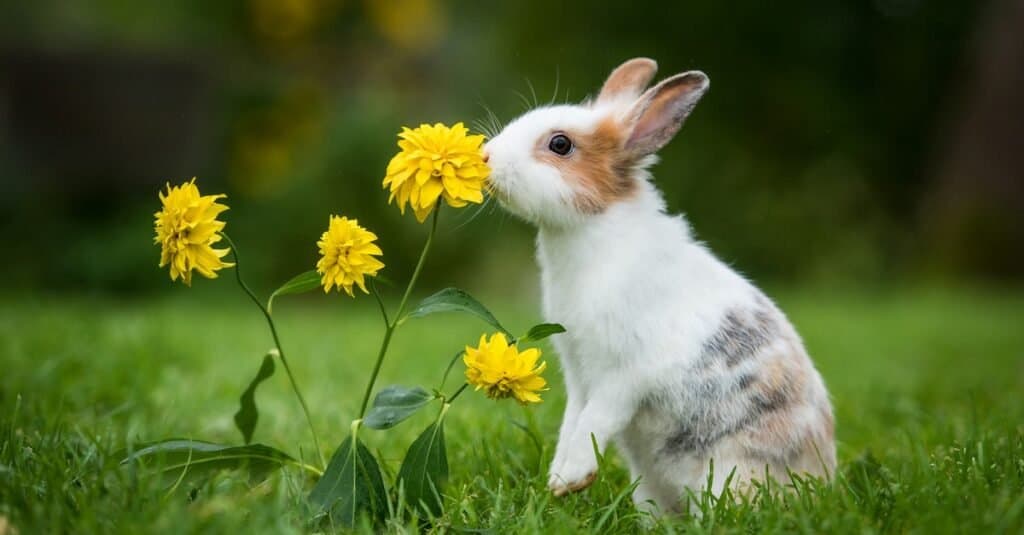
Rabbits rely on their sense of smell and sight to locate edible plants.
©Rita_Kochmarjova/Shutterstock.com
At first, rabbits appear rather defenseless. They don’t have sharp claws or teeth, and aren’t particularly strong, apart from their powerful back legs. Luckily for rabbits, they don’t need to be the strongest in order to find food. Rabbits rely on their sharp senses to not only find food but also to avoid predators. Overall, hearing is a rabbit’s most important sense. They can detect noises from far away, and while this doesn’t exactly help them find food, it’s useful in evading threats. When foraging, rabbits mostly rely on sight to help them find edible grasses and smell to help them ascertain if certain plants are ripe. They also use their sensitive whiskers to feel around in front of them. In addition, rabbits use their sense of taste to figure out if foods are safe to eat. While not known to be picky, even rabbits develop preferences for certain foods.
Rabbits primarily feed by grazing on plants in their local area over an extended period of time. Once a rabbit finds a particularly tasty spot, it will typically heavily graze in that area for around a half-hour. After that, most rabbits will then selectively graze on choice grasses or plants for another half-hour or longer. If the environments where rabbits live are largely free of predators, they can graze for even longer. As rabbits are crepuscular, they get most active at dusk and dawn, which is when you’ll most likely see them feeding in the wild. However, they may be active throughout the day if they feel safe. On the other hand, domesticated rabbits will frequently feed throughout the day if food is readily available.
What Do Rabbits Eat in the Wild?
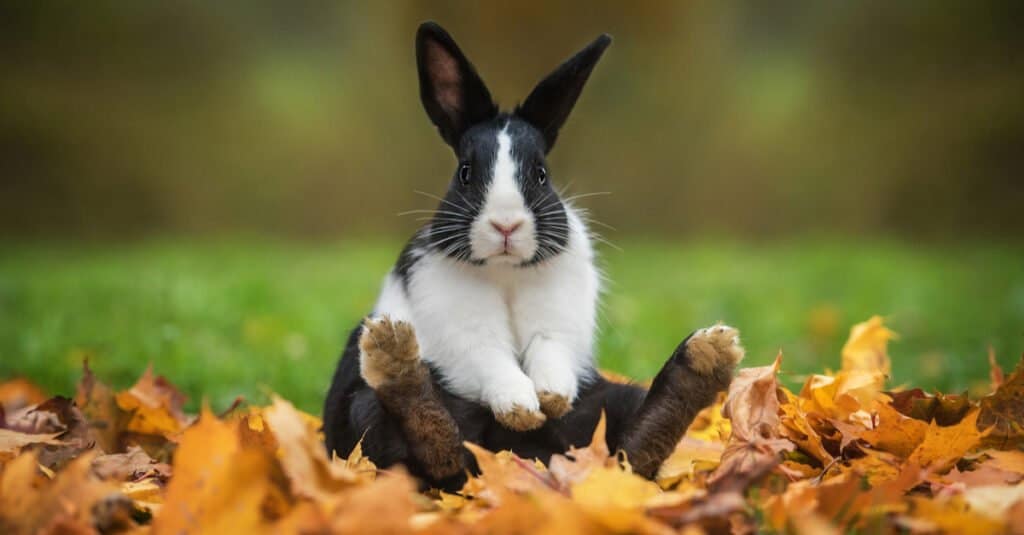
Wild rabbits predominantly eat grasses and hay, but will also eat shoots, leaves, bark, vegetables, fruits, and their own pellets.
©Rita_Kochmarjova/Shutterstock.com
Given that rabbits live in a wide variety of habitats, their diet can vary depending on where they live. Overall, wild rabbits tend to eat mostly grasses, shoots, and leaves that are locally available. In general, grasses and hays make up the bulk of a wild rabbit’s diet. Common grasses that wild rabbits consume include wheat, alfalfa, orchard grass, timothy, fescue, and ryegrass. That said, rabbits will eat just about any type of grass. If domesticated vegetables are available, wild rabbits will chow down on lettuces, carrots, and other greens. Due to this trait, gardeners and farmers often consider rabbits pests. Wild rabbits also frequently eat their soft, partially digested pellets to help get extra nutrients. Since they are so soft, the pellets are also easily digested. Rabbits get a lot of cellulose in their diet, which is difficult to digest. Therefore, rabbits eat their pellets to aid their digestion.
What Do Pet Rabbits Eat?
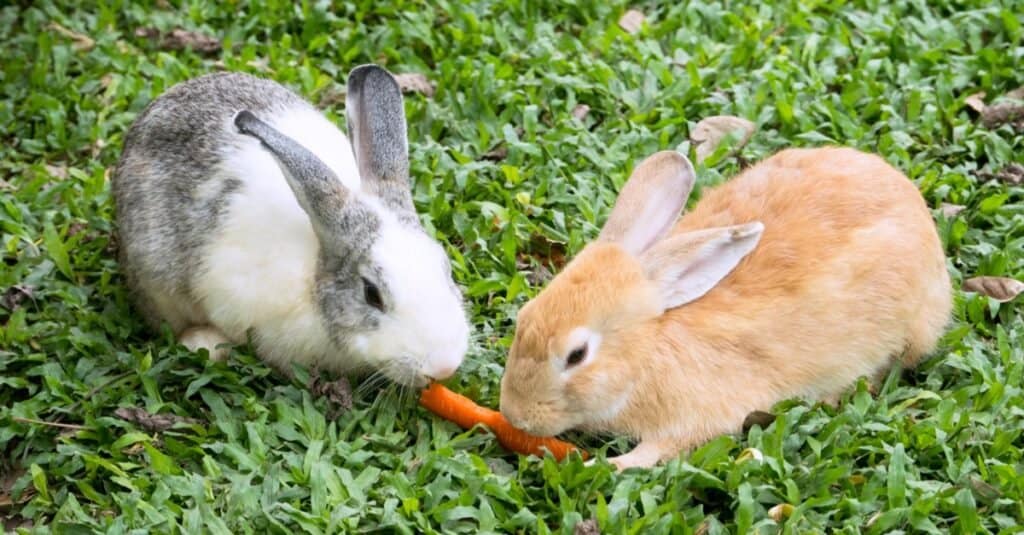
Pet rabbits can eat a variety of foods, but you should avoid feeding them too much fruit, high-carb veggies, seeds, nuts, or dairy.
©Thor Jorgen Udvang/Shutterstock.com
By and large, pet rabbits will eat the same foods as wild rabbits. Typically, grasses and hay should still make up 80% to 90% of a pet rabbit’s diet. That said, it can be difficult to find all of the wild grasses that wild rabbits eat to feed to a pet rabbit. As such, pet rabbits will eat a slightly different diet from wild rabbits. Many rabbit owners will also feed their pet bunny leafy greens and vegetables. Popular greens that pet rabbits can eat include:
- Lettuce
- Fennel
- Bok choy
- Root leaves (carrot, radish, beet, etc.)
- Cucumber
- Endive
- Sprouts
- Wheatgrass
- Watercress
- Herbs
While rabbits can eat carrots, they should not eat them too often, as carrots are high in carbohydrates. Other vegetables that pet rabbits can eat but should avoid eating too often include broccoli, clover, dandelion greens, kale, spinach, and flowers. On rare occasions, you can also feed your pet rabbit fruits. Safe fruits include:
- Apple
- Pear
- Banana
- Berry
- Grapes
- Orange
- Papaya
- Plum
- Melon
- Watermelon
In addition, many rabbit owners also feed their pet a pellet supplement. Pellet supplements are not a crucial part of a rabbit’s diet but can help them to get additional vitamins and nutrients. You’ll always want to check with your veterinarian before introducing new food to your pet rabbit. Also, make sure you avoid feeding your rabbit processed foods, cereals, dairy, potatoes, beans, or cruciferous vegetables. These foods are difficult for rabbits to digest and can make them very sick. Finally, a pet rabbit should have access to plenty of fresh water, which should be changed regularly.
What Do Baby Rabbits Eat?
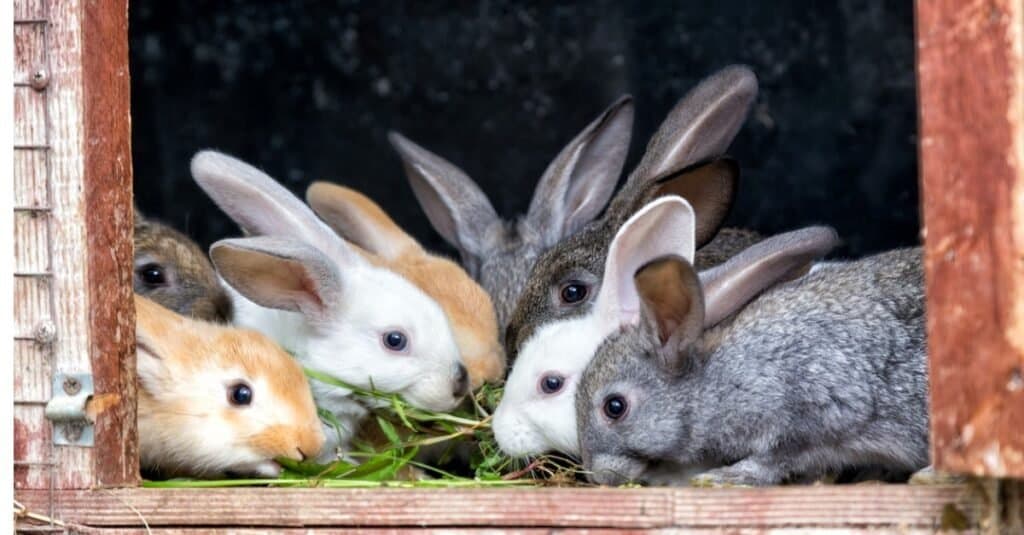
Baby rabbits will live off of their mother’s milk for the first 3 to 4 weeks of life.
©iStock.com/Laures
Baby rabbits, also known as kits or kittens, are born underdeveloped. They have no fur, and can not open their eyes. As such, baby rabbits are completely dependent on their mother or caretaker for nutrition. On average, kits will nurse for the first three to four weeks of life. Rabbit milk is very calorie-dense and delivers all the nutrients that baby rabbits need to thrive. Once they’re old enough, kits will begin to venture out and forage like adult rabbits. At this time, their diet is about the same as an adult rabbit. Pet or rescued baby rabbits separated from their mother should be fed goat milk or a specialty rabbit milk replacement. Baby rabbits cannot drink cow’s milk, and should never be fed it under any circumstances. Before introducing new food to a baby rabbit, make sure to consult with your veterinarian.
The photo featured at the top of this post is © iStock.com/ViktorCap
Thank you for reading! Have some feedback for us? Contact the AZ Animals editorial team.




